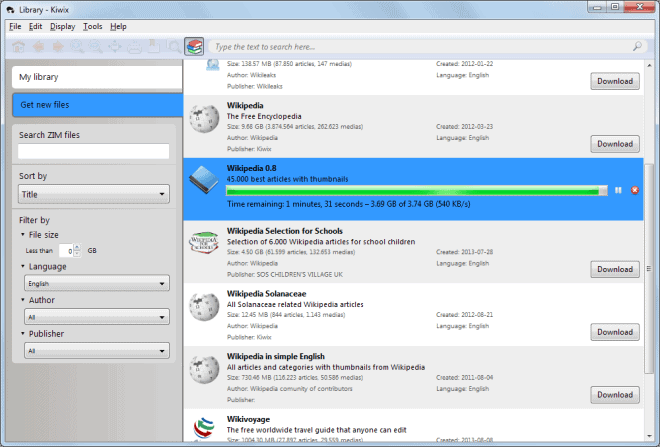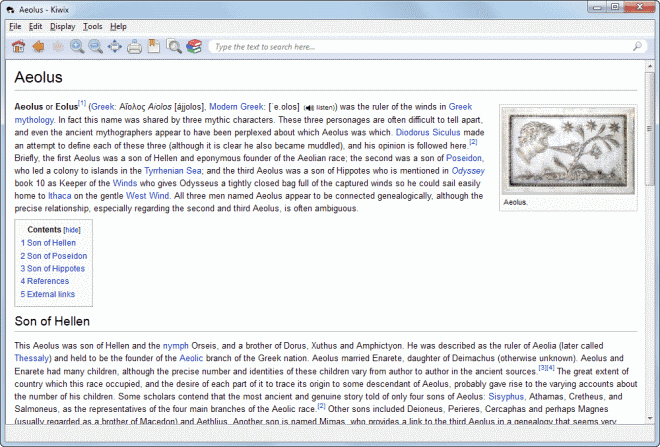Kiwix: download Wikipedia to your computer or Android for offline access

Back in the days when the first offline solutions for Wikipedia were introduced, you often did not have enough space on your mobile device to really add a larger section of the site on it. Storage space has increased on mobile devices today so that it is no longer a big issue to download two or three Gigabyte of data to the device.
As far as PCs are concerned, this was never really that much of an issue unless you are running a PC with a single Solid State Drive that has 128 Gigabytes or less of space.
Kiwix is a portable solution for desktop systems, like Windows, Mac OS X and Linux, and also for Android-based devices. It is a lightweight software / application that you can use to download Wikipedia contents to it so that you can browse those contents at anytime, even when you are offline.
As far as the PC version is concerned: you download the latest version of Kiwix from the official project website and extract it afterwards on your system. This is just the program interface and backend though. You are asked if you want to check out the newest libraries available when you first run the program, and you should, as you get a large list of Wikipedia-related libraries displayed to you then that you can download to your system.
One thing that you may want to do right away is to switch the language filter to one of the available languages to limit the results listing.
Each library is displayed with its name, icon, size, and the day it has been created. You need to pay attention to the size, as individual libraries can reach almost 10 Gigabytes of space.
Simply click on the download button to download one of the libraries to your system. The progress is displayed right on the screen, and once downloads complete, you are asked whether you want to open the newly downloaded Wiki right away.
The individual Wikis that you have downloaded open up on a homepage that highlight some of the articles available on it. You can alternatively use the search to find information you are interested in. Search is probably the better option here, and the first time you try to search you are asked if you want to create an index to speed up searches. It is highly recommended as you do but will add more data to your drive in the process.
This process may take some time depending on the size of the Wiki that you have downloaded.
The browser ships with a couple of extra features that you can use, like options to zoom in or out, print articles, use on-page find to find words or phrases, or add articles to your bookmarks for easier access.
What is not so good is that you can only switch between libraries from the "recently opened" menu under File. If a library is not listed here, it needs to be opened from the disk again.
Verdict
If you want to access Wikipedia on your local computer or on Android, then Kiwix is certainly one of the better options that you have for that. The program is really easy to use, and the built-in downloader works just fine.
It has a couple of issues, like the saving of new library files in a different folder even if you are running a portable version of the program, or the lack of switching options.
Advertisement




















The best one I have found is “xowa” to read wikipedia offline, it has support for equations, images and has an exact look of the online wikipedia.
http://sourceforge.net/projects/xowa/
Hi, I am trying a different approach about WIKIPEDIA new interfaces : doing content focused, text only, core reading features… back to wikipedia heart.
Online mode is requested for now but if project goes fine I will develop offline mode of course.
Please give a try : http://www.wikifollow.com
Which is better “WikiTaxi” or “Kiwix” ?
Kiwix is better than Wikitaxi. It’s got images, videos and details, and Wikitaxi doesn’t got all that.
Obviously Kiwix doesn’t download all of Wikipedia, which contains over 11 billion words in 27 million articles in 286 languages. http://en.wikipedia.org/wiki/Wikipedia:Size_comparisons. I assume that would total a petabyte or maybe an exabyte.
So how much does Kiwix download?
Kiwix does download all of English Wikipedia. As Martin points out, the 10 GB is packed data. This 10 GB should be the complete text of English Wikipedia from January 2012.
The 11 billion words statistic doesn’t refer to **English Wikipedia** but to all the **combined Wikipedias**: English Wikipedia; French Wikipedia; German Wikipedia; etc… Kiwix offers about 40 Wikipedias out of roughly 123 total Wikipedias: http://www.kiwix.org/wiki/Wikipedia_in_all_languages. Since these are the largest wikis, I’d say that it probably covers around 7 billion of those 11 billion words.
I would venture a guess that the total disk size of all these wikis is about 100 GB. (current revision only; no history; no images). It’s unlikely that 11 billion words would use 1 petabyte of space (much less an exabyte). If you multiply 11 billion words by an average length of 5 characters, you’d only get 55 billion characters. If you assume these to be all ASCII characters (1 byte per character), that’s only about 53.7 GB. If you assume they’re all UTF-8 (4 bytes per character), it would still only max out at 214.8 GB.
It depends on what you select. The English Wiki is listed with about 10 Gigabyte. That is probably packed data.
I forgot, Okawix also is a good alternative to have offline wikipedia.
http://www.okawix.com/
I use kiwix, is really good for times when you don’t have a connection nearby.
The only issue that I found is that the articles collection are not update so often. The Spanish version that I use is from beggining from 2012.
There is a new one available at: http://download.kiwix.org/portable/wikipedia_es_all.zip.torrent
I mostly use Pocket for offline reading but Kiwix might be better option to look for new stuff while offline but then again how many people happen to be offline these days..
BTW.Martin,did you hear of RedPhone ?
https://whispersystems.org/